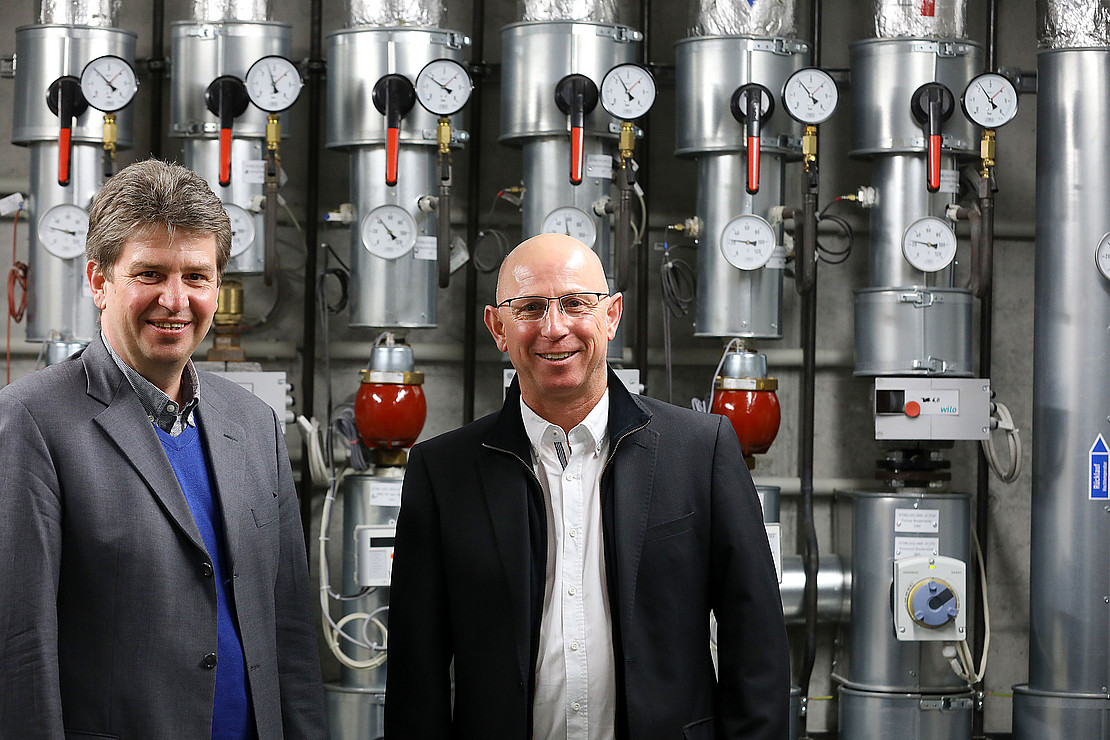This page contains automatically translated content.
These ideas are worth cash
 Image: Andrea Fischer
Image: Andrea FischerMore than 25,000 students, more than 3,000 employees and a building area of more than 350,000 square meters to manage - the operation of the University of Kassel resembles a small city in itself in many respects. It is clear that energy consumption is also in dimensions that are more like those of a city than those of a private household. For example, the university consumes around 23,000 megawatt hours of electricity annually and requires more than 110,000 cubic meters of water.
The associated costs amount to several million euros per year - a good reason to actively work on ways to save money. But by no means the only one, as University Chancellor Dr. Oliver Fromm says: "With our goal for sustainable operation, the University of Kassel is assuming social responsibility - as one of the largest employers in the region, we have to do our part to protect the climate, and that includes giving our employees opportunities to actively live sustainability in their everyday work."
Award-winning ideas put into practice
People like Georg Mösbauer and Dirk Schnurr are working on the concrete implementation of this objective. Together with other employees from the Building, Technology and Real Estate department, the two are currently working on the university's third sustainability report and coordinating many of the activities described in it within the company.
"Many employees and students are not even aware of the dimensions on which the university's energy and resource consumption moves," says Georg Mösbauer, head of the Occupational Safety and Environmental Protection Group. For example, around 15 million sheets of paper are consumed at the University of Kassel every year. Slightly less than half of that is recycled paper - to produce the other half of virgin fiber paper requires about 100 trees, more than 2 million liters of water and 430,000 kWh of energy. And that's every year.
To reduce paper consumption, therefore, double-sided printing and copying was initially introduced as the default setting on the multifunction devices in the university libraries. "In the first two weeks after the changeover alone, a good 6,000 fewer A4 sheets were used as a result," reports Mösbauer. This measure is now to be transferred to other buildings and facilities.
This savings idea emerged from an ideas competition in 2016, in which suggestions for the sustainable development of the university were collected. "We also received many other suggestions as part of this competition, with the aim of reducing water, electricity and heat consumption or increasing the proportion of e-mobility - these are valuable impulses for us in our planning," says Mösbauer.
Sustainable financing
The "Intracting" project, which Dirk Schnurr is overseeing, is also about planning. Intracting is a financing instrument that essentially means financing energy efficiency measures from within. The money saved through concrete measures is then used to finance new measures directly in the university budget. "Energy intracting already shows success in the short term, but it pays off above all in the long term," says Dirk Schnurr, who has been employed as energy efficiency manager at the university since 2017.
Schnurr calculates that the measures already implemented by the end of 2019 will add up to total savings of around 14,300 megawatt hours of primary energy, more than 480 tons of CO2 and more than 2 million euros in money saved over the next ten years.
"We also got a huge boost for the project from the cdw foundation, which is funding solar installations worth around one million euros on the roofs of university buildings over ten years," Schnurr describes. By the end of the project's duration, the cost savings from avoided electricity purchases from the grid will amount to around €200,000 per year. "In addition to this financial benefit, the cooperation project also contributes to climate protection, as the use of the sun as an energy source will reduce the burden on the atmosphere by 2,600 tons of CO2 equivalents by 2030," Schnurr reports.
Information on the Intracting project and the university's other activities in the area of operational sustainability can be found in the newly created section on the university homepage at https://www.uni-kassel.de/uni/universitaet/profil/profil-umwelt-und-nachhaltigkeit/umwelt-und-nachhaltigkeit.